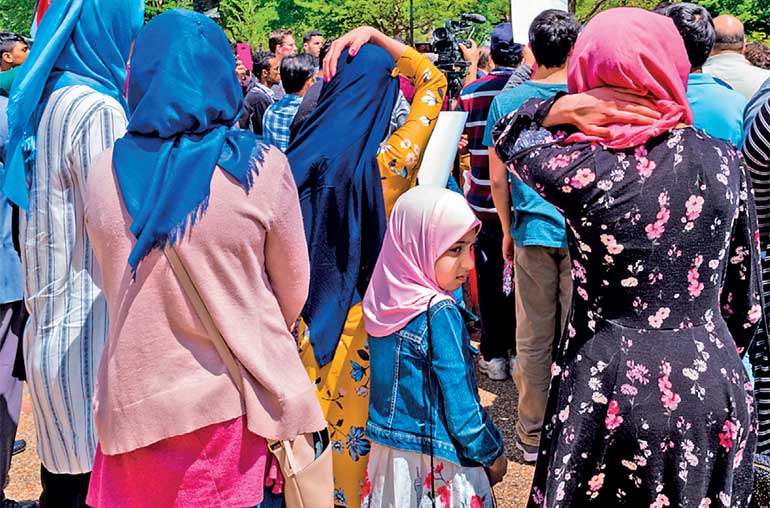Thursday Feb 19, 2026
Thursday Feb 19, 2026
Thursday, 9 February 2023 00:27 - - {{hitsCtrl.values.hits}}

It is only by coming together as citizens of this country that we can ensure the inalienable fundamental rights of Muslim women and children without being appropriated either by majoritarian state agenda or by conservative Muslim community agenda
|

At a gathering of women for a home cooked meal at Thai Pongal, a Hindu harvest festival, in the Eastern Province of Sri Lanka, a Muslim woman remarked that last year 65 young girls in her community were married-off before their O’ Levels. The women listening knew that the economic crisis was driving families to take desperate measures. They questioned as to why the law was unable to protect these children from early marriages. The conversation quickly turned to the lack of reform of the Muslim Marriage and Divorce Act (MMDA), which still permits the marriage of Muslim girls as young as 12 and even younger with the permission of the Quazi.
Meanwhile, we were told of meetings across the country led by certain Muslim religious leaders calling for communities to reject any forthcoming reforms proposed by the Government. One preacher had ferociously defended the position that girls should be able to marry even at the age of nine and claimed that women becoming Quazis (judges) was dangerous. A woman celebrating Pongal asked me with concern, “Can’t you talk to your religious leaders and explain to them that it’s good for children to finish their education?” Her question sparked a feeling of solidarity but also a hopelessness that Muslim women feel about the harm that continues daily under the MMDA hung heavy in the air. “No one listens…they do not care,” I replied, feeling frustration and sadness.
The road to reforms has been frustratingly long
For over 40 years, Muslim women and men have worked towards reforming the Muslim Marriage and Divorce Act (MMDA). Muslim women’s organisations have been in the forefront of calling for reforms, as they have borne witness to the devastating consequences of failing to reform this law. After thousands of individual testimonies have revealed experiences of injustice and cruelty, several government and non-governmental committees repeatedly suggesting reforms and countless meetings with successive Presidents, Prime Ministers, Ministers of Justice, religious administrators and clerics, the long-awaited reforms appear to be precariously moving forward. However, what could be the last mile of this long journey, is facing every challenge that can be thrown its way.
Progressive reforms will strengthen MMDA’s adherence to Islamic values
Values attributed to any religion are always historically situated and the practice and application of fundamental values are constantly evolving across time. With this understanding, it is important to acknowledge, at the outset that the MMDA is a colonial piece of legislation. It is based on the Dutch-introduced “Special Laws relating to Moors or Mohammedans and Other Native Races” and was maintained and codified into statute under the British. Contrary to claims, it is far from divine in its words, procedures and the official positions it creates. In fact, it is a mélange of some Batavian Islamic rulings as codified by the Dutch, Tamil custom (Kaikuli) and English procedural rules.
The MMDA also fails to mention the uniquely Islamic practices of a marriage contract, mata’a (alimony), Mubarak (divorce by mutual consent) and Khula divorce regimes and legal protections for property of the wife.
The MMDA as it stands now is far from Islamic. In its current form, the ways in which it is misused, and its implementation, it is a departure from the radical thinking that Islam championed, of equal and sometimes preferential status afforded to women. Women’s testimonies about their treatment under MMDA are a depressing account of how distant from the core Islamic values of justice, compassion and kindness the law actually is. The proposed reforms address many of these issues and in fact steers the law towards a more Islamic, and democracy and rule of law compliant system.
Reforms are caught between a politics of misogynistic power, fear, hate and non-interference
The process of reforming the MMDA contends with pressures from multiple sides. A fear of women holding office, gaining opportunities to assert financial rights and to hold husbands accountable when they enter polygamous marriages without caring for the existing family is palpable in the debates.
The deeply un-Islamic and unconstitutional practices and injustices perpetuated under this law have benefited men in the community. They do not want to give these up. They use the platform of identity politics to say that making changes to Muslim personal law is an erosion of rights afforded to ALL Muslims. They want to keep the arbitrary and unsupervised power of the MMDA untouched by declaring it ‘divine’. These constituencies that are male-led and often anti-women keep the Muslim political elites afloat. As such, historically, we have seen Muslim political leaders resisting reform of Muslim personal law.
Political elites, with privilege and education, sometimes know better but will not provide strong leadership for betterment of their communities. Controlling the discourse of ‘Muslim family’ is their ticket to power. Thus, they continue to employ this discourse at the cost of the rights of women and children of Muslim society. Repeatedly, during election time when the major parties are courting the Muslim vote is when these ‘community’ and political figures amplify their demands.
This is why Muslim women activists face vicious attacks when they try to shed light on the ugliness they encounter within their families and communities, because it threatens power structures. Most recently, we have seen activists labelled as ‘working against Islam’, ‘masterminds’ conjuring sentiments of criminality, ‘the threat from within’, a comment about gathering 6,000 women to demand for the need for reforms was recast as a threat to the state. Sharing photographs and using this language targets individuals and gives permission for ‘righteous’ violence. Muslim politicians have been silent for too long. They must care more about their power and voter bases than the welfare of the communities they represent.
Simultaneously, consecutive Sri Lankan governments protect power-holds by deploying a language of non-interference. A language of ‘leave it to the community’, ‘my hands are tied’, ‘your people don’t want change’, ‘it’s too sensitive’. All of these statements are but masks for racism and misogyny. This dynamic has permeated everywhere – into professional, academic and civil society spaces. Muslim women are doubly marginalised by this language, as it shuts the door on the faces of Muslim women raising grievances.
Consecutive Sri Lankan governments have engaged in destructive majoritarian politics of outright racism, fear mongering and terrorising of minority peoples. Doing away with personal laws is a constant and easy threat deployed by majoritarian agendas. Community gatekeepers also use this threat to keep their people, particularly Muslim women, from asking for change. It is this politics of fear that contributes to silencing of and sometimes retaliation against ordinary Muslims for talking about their grievances openly.
More generally, Muslim reformists must contend with the fact that since independence, successive Sri Lankan governments have failed to maintain a strong commitment to pluralistic policies and have engaged in non-participatory and opaque law-making processes. Similarly, all political parties are guilty of a scant commitment to securing substantive, structural change for women including that of political representation for ALL women. Any advancements in the law have been elite-led often seems to happen only when the stars align! This deeply divisive, patronage-based, discriminatory and opportunistic political culture creates an almost impermeable barrier to any advancement of Muslim women’s rights and for that matter of advancement of the rights of any marginalised group in the country.
Wedged between this politics of hate and fear being played by the majoritarian state and the self-proclaimed representatives of the Muslim community, ordinary Muslim families are struggling to cope with the economic crisis, like all other ordinary families in Sri Lanka. They face increasing daily concerns about money, food, livelihoods and overall economic security for themselves and their children. The emotional labour of worrying about it all alone is crippling. Meanwhile, the State continues to crush avenues to complain and protest for justice. People are also dealing with the electoral shenanigans that prey on vulnerabilities and the making afresh the same old promises.
Token bills promising women’s equality are charging ahead of law reforms that have been struggling for state recognition for decades, including the MMDA. It is amid the growing complexities of daily struggles that Muslim women activists continue to nurture the call for MMDA reforms. It is precisely because of these complexities and the odds stacked against Muslim women that all citizens who want change and believe in equality and justice ought to support Muslim women in their call for progressive reforms. It is only by coming together as citizens of this country that we can ensure the inalienable fundamental rights of Muslim women and children without being appropriated either by majoritarian state agenda or by conservative Muslim community agenda.
Everyone should support MMDA reforms
To support these reforms is to protect little children from being ‘given away’ in marriage and accords equally able adult women the same right to be proactive and full members of society in their public and private lives as the men in their community. If, as peoples of this country, we cannot find it in ourselves to make the time, effort and commit to this, we not only fail Muslim women and children but we fail to understand what system change really means. Nation-wide support for Muslim women activists, for their just demands, at this time will pierce through a politics of elite power that we as Sri Lankans are trying to reject. Even at the on-coming local government elections choose candidates that care about marginalised communities. Perhaps one day, together, we can change this feeling that all of us have about many issues, that “No one listens, they do not care”.
(The writer is an Attorney at Law and a co-founder of Muslim Personal Law Reform Action Group (MPLRAG). Please direct comments and clarifications to [email protected].)